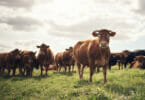The following report is by Food Drive:
As the U.S. Department of Agriculture prepares to launch its Strengthening Organic Enforcement regulations March 19, some wonder if unprepared companies will get left behind.
The new rule is the most significant change to organic certification since the program’s start in 1990, and there’s growing concern that large portions of the food industry — importers, brokers, handlers and distributors — haven’t made the necessary compliance changes.
Nate Ensrud shares this fear. As an executive with FoodChain ID, one of the largest organic certifiers in the U.S., he’s noticed little action across the industry to meet SOE’s changes.
Here’s why that’s a problem and how the industry can rise to the challenge.
What’s Changing
Over the past three decades, the growth of the organic industry has out-scaled its initial regulations. That’s led to gaps in enforcement that allowed for loopholes and outright fraud.
“The SOE rule is part of USDA’s continuous improvement of the organic standards to meet the growing complexity of food supply chains,” said a spokesperson for the USDA’s Agricultural Marketing Service.
“SOE closes gaps in the current regulations by making sure USDA can more completely oversee and enforce the supply chain that takes a certified organic product from farm to market,” the spokesperson added.
We are closing loopholes specifically in the certification process by requiring organic certification of more businesses in the supply chain, like brokers and traders that were not previously required to be certified. This better protects the USDA organic seal and keeps fraud out of the market.
Problems With Non-Compliance
Just days away from the deadline, Ensrud believes that non-compliance is inevitable — and it will be disruptive.
“Unfortunately, over the last few months, the net change in USDA National Organic Program (NOP) certified organic operations in the U.S. was essentially zero,” Ensrud said “That means there are thousands of companies, foreign and domestic, in the organic food supply chain that will need new certification.”
He believes that companies out of compliance will feel the pinch in a bevy of ways.
“Here’s one example,” Ensrud said. “Suppose a manufacturer of organic breakfast cereals finds that a handler of organic raisins in their supply chain hasn’t pursued certification in light of SOE. Now the manufacturer must find a replacement, and it might suffer production disruption in the meantime.”
What Can The Food Industry Do To Prepare?
Ensrud believes the most significant issue remains a need for more information.
Some organic suppliers are still unaware of the March 19 compliance requirements. Because importers, exporters, brokers, traders, and storage facilities have not historically been required to be certified, we believe there will be an increase in last-minute organic certification applications.
Ensrud is working to get the word out to avoid this pileup. “We’re reaching out to our customers with the message ‘protect your supply chain.’ We recommend that organizations look at all suppliers on their supply chain and reach out to them to ensure they are aware of the new regulations and, if they need to apply for certification, to do so immediately.”
As a starting point, he suggests that businesses perform self-assessments to gain insight into whether their operations require certification under the new regulations. “FoodChain ID provides a quick starting point, and companies can also schedule a quick consultation with our organic certification experts here.”
While the certification process seems overwhelming at the start, engaging with food certification or compliance companies offers a supportive way to meet the deadline without an interruption in the supply chain.
AUTHOR COMMENTARY
It’s a joke that the American food supply is so toxic that that government has to create and regulate what can be considered “organic,” giving them yet even more control over what people can and cannot eat. It’s a mess. Even so, I recommend you network with local farmers to source your organic meats, produce, and other foods; grow your own food, and cook things for scratch from that. But, should you buy some ingredients and foods from the store, spring for the USDA Organic labeled kind.
Beloved, I wish above all things that thou mayest prosper and be in health, even as thy soul prospereth.
3 John 2
With these new regulations, whether for the good or for the bad, based on what has been reported, it’ll be interesting to see just how many companies no longer qualify and could potential lose their status, because getting that label is not the cheapest for companies; and should they lose the label, then will this cause any noteworthy food disruptions.
[7] Who goeth a warfare any time at his own charges? who planteth a vineyard, and eateth not of the fruit thereof? or who feedeth a flock, and eateth not of the milk of the flock? [8] Say I these things as a man? or saith not the law the same also? [9] For it is written in the law of Moses, Thou shalt not muzzle the mouth of the ox that treadeth out the corn. Doth God take care for oxen? [10] Or saith he it altogether for our sakes? For our sakes, no doubt, this is written: that he that ploweth should plow in hope; and that he that thresheth in hope should be partaker of his hope. (1 Corinthians 9:7-10).
The WinePress needs your support! If God has laid it on your heart to want to contribute, please prayerfully consider donating to this ministry. If you cannot gift a monetary donation, then please donate your fervent prayers to keep this ministry going! Thank you and may God bless you.








You stayed: “Even so, I recommend you network with local farmers to source your organic meats”
I started raising chickens for our own meat and for sale to neighbors. I use locally grown feed. This feed is Roundup GMO grain. I have to use this because there is not a non-GMO farm within a 3 hour drive for me to puchase organic feed. The feed cost is .28 cent a pound. Which will be a finished 5 pound bird about $30 making a 20% margin. Kalmbach organic feed is about .86 cents a pound. That makes the price of a finished 5 pound Cornish Cross chicken about $50 if I want to make 20% margin. Both of these figures utilize “USDA processing” of the birds. I am only allowed to process 1000 birds myself in my State. This is a cost of $5/bird. Translation: the USDA doesn’t want you to grow your own food. Everything is stacked against unsubsidized family farms. You will pay dearly for a label on the bag that says “organic”. New regulations will cause higher costs which means impossibly expensive clean food.
I am sick of this Mafia we call a government. We are all slaves to it.
Thank you for this report!